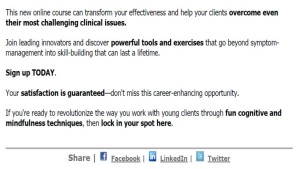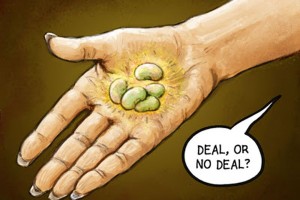 So, you’re out for a walk. It’s a beautiful day but you’re caught up in your thoughts, feeling a bit discouraged and concerned.
So, you’re out for a walk. It’s a beautiful day but you’re caught up in your thoughts, feeling a bit discouraged and concerned.
For whatever reason, some of the people you are working with aren’t improving. You’re no novice clinician. You know impasses are a common feature of therapeutic work. Still, this time your knowledge and experience aren’t helping. You’re stuck.
That’s when you spot someone on the path ahead, leaning comfortably against a tree. As you are about to pass by, the stranger smiles kindly, then steps forward.
“Good morning,” he says, calling you by name.
Although you can’t quite place him, you reply in a friendly manner, barely slowing your pace.
“I can see that you’ve got a lot on your mind,” he continues, now walking alongside. It’s his next question that stops you in your tracks.
“Thinking about your clients again, aren’t you?” Slowly shaking his head from left to right, “It’s hard when you’re not as helpful as you mean to be.”
Before you can say, “Jack and the Beanstalk,” the man reaches into his pants pocket. Removing his hand, he slowly extends it toward you eventually opening it, palm up.
“Quickly,” he demands, “How many beans do you see?”
Still stunned by the whole experience, you reply, “Five.”
“Right you are!” he exclaims excitedly, “And because you are so sharp, you can easily see these are no normal beans. They’re magical. Plant them in your office and by morning they’ll grow right up to the sky, providing a pathway for even your most difficult and challenging clients.”
“Really?” you respond, now feeling more than a bit incredulous.
The man doesn’t miss a beat. “Of course,” he instantly reassures, “These beans are evidence-based.” Pointing to a briefcase near the tree, “In there, I have many studies showing beans grow when planted, as well as plethora of PET scan images documenting how climbing the stalks causes real changes in the prefrontal and motor cortex of the brain.”
You move back a step, rub your chin, and eye the man suspiciously.
“Come on,” he says, “You want to help, don’t you? What you’re doing now isn’t working. You know that. What have you got to lose?”
That is the question. So, what’s the answer?
If you’ve been a therapist for more than a few years, you’ve likely discovered our field is full of beans, bean sellers, and bean counters. As just one example, for three decades CBT has been touted as the ‘treatment of choice” — a revolutionary advance, actually — for a wide array in mental health problems.
 Rarely does a day pass that I don’t receive a brochure (or email to the left) for a workshop on the approach. Search the term on Amazon and you’ll find more than 4000 books and related products. At the same time, regulatory bodies around the world have created practice guidelines heavily skewed toward CBT.
Rarely does a day pass that I don’t receive a brochure (or email to the left) for a workshop on the approach. Search the term on Amazon and you’ll find more than 4000 books and related products. At the same time, regulatory bodies around the world have created practice guidelines heavily skewed toward CBT.
And yet, there is no evidence that any of this leads to better outcomes. The facts are: (1) CBT is no more effective than any other therapeutic approach (1, 2); (2) training in CBT does not improve therapist effectiveness (1); and finally, (3) guidelines favoring the adoption of CBT over other approaches have not resulted in better outcomes, and may inadvertently have led to a decline (1, 2, 3, 4, 5).
Claims about the novelty and effectiveness of other popular approaches fare similarly, including EMDR and Acceptance and Commitment Therapy (ACT). Here again, books, workshops, and claims abound. Ultimately, however, these two methods work about as well, but no better, than any other approach. Plus, there’s no evidence that training in either improves therapist effectiveness (1, 2, 3).
Returning to the question, it turns out a critical opportunity is lost in the trade for a handful of “magical” beans: individual professional development. As all practitioners know, and have likely counseled their own clients, it is precisely at those moments when we are feeling most stuck that the greatest possibility for growth exists. It’s also when we’re most vulnerable to promises of a shortcut — the proverbial “goose that lays a golden egg.”
Until very recently, there’s been no alternative. In Chapter 2 of the new book, The Cycle of Excellence, friend and colleague Daryl Chow and I describe how practitioners can use deliberate practice to both identify and move beyond their individual growth edge. It is not an easy route. At the same time, however, it is the only approach to professional development that has been shown to lead to measureable improvements in effectiveness on par with rates seen in Olympic atheletes in training (1).
If you’re interested, visit here to receive a copy of the chapter.
Until next time,
Scott
Scott D. Miller, Ph.D.
Director, International Center for Clinical Excellence
P.S.: Daryl and I will be together in Chicago in August for a two-day workshop on deliberate practice. A few spots remain for this intimate, intensive training. We’ll presenting the latest research — including findings from the “Difficult Conversations in Therapy” randomized controlled trial — and help each participant develop and refine an individualized deliberate practice plan. Just click on the image below to register.





What? I’ve spent a lot on my magical beans! They’ll eventually grow, right?
One thing I took from the Heart and Soul of Change years ago–I hope this is what was intended–is that the important factors are that you and your client believe that what you are doing can help and that you have a good therapeutic alliance. Having a theory is more important that which theory it is.
what a delightful and creative restatement of the troubles with evidence-based treatment protocols!
thank you for the free chapter – looking forward to reading 🙂
Hi Scott, What I have found over the years is that my Clients are my greatest and best teachers-not books, magazine articles or theories. My Clients “course correct” me and I act as their GPS. I learn from my Clients and my Clients achieve the therapy goals they have set out for themselves more often than not. Best Regards, Jeff Brosnan, LMFT
Jeff, you are in good company! Researchers Ronnestadt and Orlinksy found that the majority of clinicians cite their clients as the best teachers!
Thanks for sharing. You have an amazing writing skills I am always involved in your posts this post is very nice. I am student of mind reading skills.
Dear Scott, I like the fact that you keep raising the bar for therapists. However, in writing a chapter on diagnosis and therapy for Springer and referencing your work, I realize that therapists need to do more than just reading about how to treat clients, they also need more psycho- education about what condition they are treating . From my experience specializing in the field of school and workplace bullying , I fear that most therapists do little reading, research and analyzing of why they adopt certain approaches in therapy. The method of treatment has become more important than the causes of client distress. Thus, for example, not all traumas are the same, bullying can cause a different trauma , few know where bullying is mentioned in the the DSM-5 and so on. The fact is that in keeping up with current research , we are more likely to improve ourselves.
Heard you maybe coming to New Zealand later in the year. Is this correct? When & where?